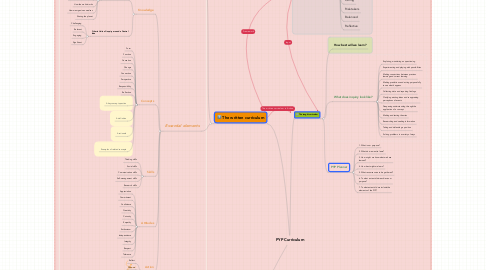
1. The written curriculum
1.1. What do we want to learn?
1.2. Essential elements
1.2.1. Knowledge
1.2.1.1. PYP transdisciplinary themes
1.2.1.1.1. Who we are
1.2.1.1.2. Where we are in place and time
1.2.1.1.3. How we express ourselves
1.2.1.1.4. How we express ourselves
1.2.1.1.5. How the world works
1.2.1.1.6. How we organize ourselves
1.2.1.1.7. Sharing the planet
1.2.1.2. Criteria Units of inquiry around a Central Idea
1.2.1.2.1. Challenging
1.2.1.2.2. Relevant
1.2.1.2.3. Engaging
1.2.1.2.4. Significant
1.2.2. Concepts
1.2.2.1. Form
1.2.2.2. Function
1.2.2.3. Causation
1.2.2.4. Change
1.2.2.5. Connection
1.2.2.6. Perspective
1.2.2.7. Responsibility
1.2.2.8. Reflection
1.2.2.9. A key concept question
1.2.2.10. A definition
1.2.2.11. A rationale
1.2.2.12. Examples of related concepts
1.2.3. Skills
1.2.3.1. Thinking skills
1.2.3.2. Social skills
1.2.3.3. Communication skills
1.2.3.4. Self-management skills
1.2.3.5. Research skills
1.2.4. Attitudes
1.2.4.1. Appreciation
1.2.4.2. Commitment
1.2.4.3. Confidence
1.2.4.4. Creativity
1.2.4.5. Curiosity
1.2.4.6. Empathy
1.2.4.7. Enthusiasm
1.2.4.8. Independence
1.2.4.9. Integrity
1.2.4.10. Respect
1.2.4.11. Tolerance
1.2.5. Action
1.2.5.1. Reflect
1.2.5.2. Choose
1.2.5.3. Act
2. The assessed curriculum
2.1. How will we know what we have learned?
2.2. Vernieuwing
2.3. Assessment components:
2.3.1. Assesing
2.3.2. Recording
2.3.3. Reporting
3. The taught curriculum
3.1. How best will we learn?
3.2. What does inquiry look like?
3.2.1. Exploring, wondering an questioning
3.2.2. Experimenting and playing with possibilities
3.2.3. Making connections between previous learning and current learning
3.2.4. Making predictions and acting purposefully to see what happens
3.2.5. Collecting data and reporting findings
3.2.6. Clarifying existing ideas and reappraising perceptions of events
3.2.7. Deepening understanding through the application of a concept
3.2.8. Making and testing theories
3.2.9. Researching and seeking information
3.2.10. Taking and defending a position
3.2.11. Solving problems in a variety of ways
3.3. PYP Planner
3.3.1. 1. What is our purpose?
3.3.2. 2. What do we want to learn?
3.3.3. 3. How might we know what we have learned?
3.3.4. 4. How best might we learn?
3.3.5. 5. What resources nee to be gathered?
3.3.6. 6. To what extent did we achieve our purpose?
3.3.7. 7. To what extent did we include the elements of the PYP?
